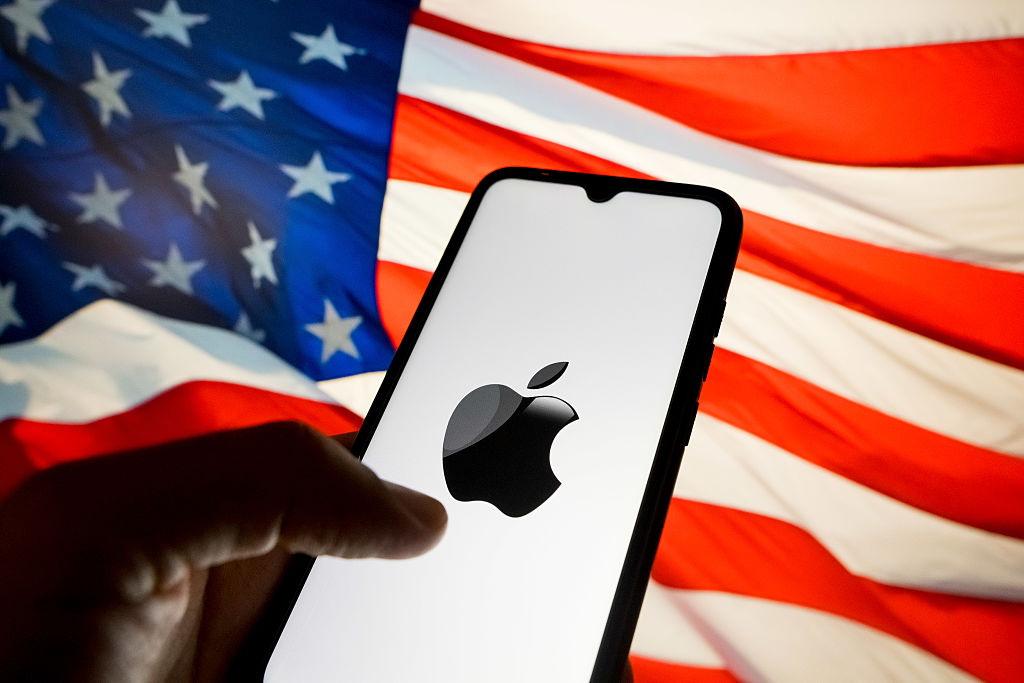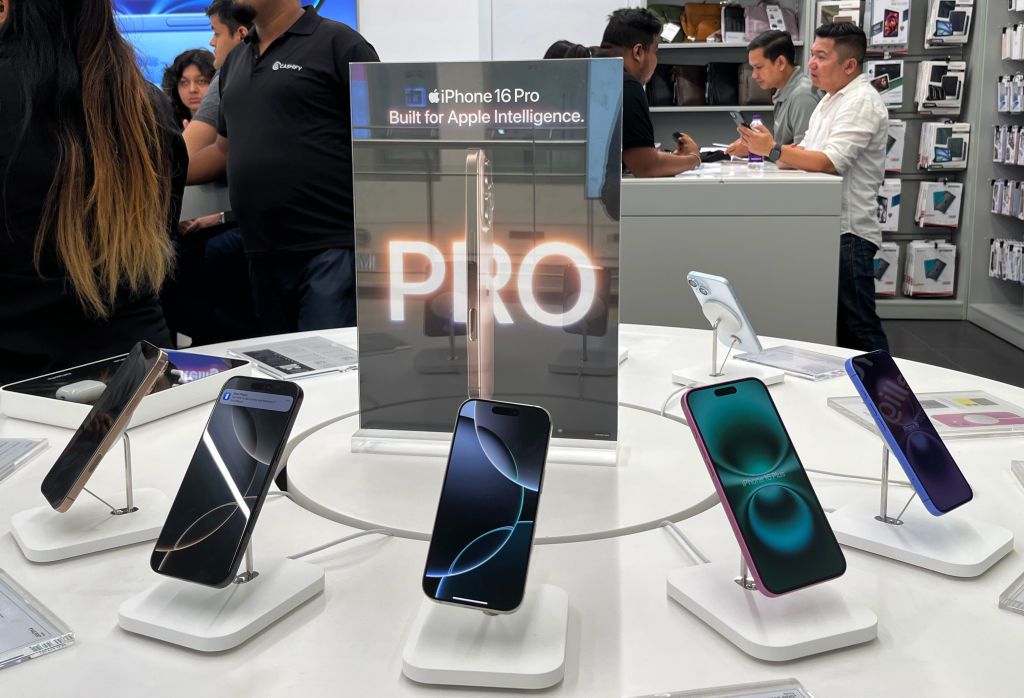How Apple’s Tariff Strategy Could Affect Your Next iPhone Upgrade
Apple’s $100 billion U.S. expansion could shift iPhone assembly stateside — impacting pricing, availability and your next upgrade decision.


Profit and prosper with the best of Kiplinger's advice on investing, taxes, retirement, personal finance and much more. Delivered daily. Enter your email in the box and click Sign Me Up.
You are now subscribed
Your newsletter sign-up was successful
Want to add more newsletters?

Delivered daily
Kiplinger Today
Profit and prosper with the best of Kiplinger's advice on investing, taxes, retirement, personal finance and much more delivered daily. Smart money moves start here.

Sent five days a week
Kiplinger A Step Ahead
Get practical help to make better financial decisions in your everyday life, from spending to savings on top deals.

Delivered daily
Kiplinger Closing Bell
Get today's biggest financial and investing headlines delivered to your inbox every day the U.S. stock market is open.

Sent twice a week
Kiplinger Adviser Intel
Financial pros across the country share best practices and fresh tactics to preserve and grow your wealth.

Delivered weekly
Kiplinger Tax Tips
Trim your federal and state tax bills with practical tax-planning and tax-cutting strategies.

Sent twice a week
Kiplinger Retirement Tips
Your twice-a-week guide to planning and enjoying a financially secure and richly rewarding retirement

Sent bimonthly.
Kiplinger Adviser Angle
Insights for advisers, wealth managers and other financial professionals.

Sent twice a week
Kiplinger Investing Weekly
Your twice-a-week roundup of promising stocks, funds, companies and industries you should consider, ones you should avoid, and why.

Sent weekly for six weeks
Kiplinger Invest for Retirement
Your step-by-step six-part series on how to invest for retirement, from devising a successful strategy to exactly which investments to choose.
Apple announced on Wednesday that it would invest $100 billion to expand its manufacturing operations in the United States.
The Apple U.S. investment is the company’s latest effort to avoid President Donald Trump's tariffs, penalizing businesses for manufacturing products or sourcing components from overseas.
Earlier this year, Apple announced a $500 billion investment in increasing its manufacturing presence in the United States. Together, the moves mark a major strategic shift that could reshape where and how Apple devices are made — and potentially how much they cost.
From just $107.88 $24.99 for Kiplinger Personal Finance
Become a smarter, better informed investor. Subscribe from just $107.88 $24.99, plus get up to 4 Special Issues

Sign up for Kiplinger’s Free Newsletters
Profit and prosper with the best of expert advice on investing, taxes, retirement, personal finance and more - straight to your e-mail.
Profit and prosper with the best of expert advice - straight to your e-mail.
For consumers, that could mean higher iPhone prices, limited supply and tough upgrade decisions ahead.
How tariffs are affecting Apple
Apple has been heavily impacted by the Trump tariffs.
While most Apple products are manufactured in China, Apple started to move some production to India and Vietnam during Trump’s second term. Even so, the ever-changing tariffs on China and other countries have hit the business hard.
Apple predicts it's facing $1.1 billion in tariff-related costs in the next quarter, according to The Hill. The company has already amassed $800 million in tariff costs in the previous three months.
Get a free iPhone 16 Pro when you transfer service to T-Mobile. They will also pay off your old phone, up to $800.
What the Apple U.S. investment means
During an Oval Office meeting, Apple CEO Tim Cook announced the investment of an additional $100 billion to launch an American manufacturing program. The program will bring components of Apple’s supply chain to the United States.
That manufacturing expansion includes building a supply chain to manufacture chips in 24 factories in 12 states. Apple will also expand its partnership with Corning, a glass supplier, to build iPhones and Apple Watches with glass manufactured in Kentucky.
The Apple U.S. investment means more components will be manufactured domestically, but Cook didn’t commit to bringing iPhone assembly to the USA. He stated that iPhones will be assembled overseas "for a while," but highlighted the fact that Apple is manufacturing many components in the United States.
During the event, Trump threatened to implement a 100% tariff on semiconductors and chips that are manufactured internationally but explained that companies committed to building those components in the United States wouldn’t be charged.
"But the good news for companies like Apple is, if you’re building in the United States, or have committed to build — without question, committed to build in the United States — there will be no charge," Trump said. He did not provide additional details on when that 100% tariff might be implemented.
What the Apple tariff strategy means for device prices

With its U.S. investment commitment, Apple appears to be avoiding some tariffs that Trump has implemented, such as the extra 100% tariff on semiconductors and chips produced overseas. Its total $600 billion commitment to United States manufacturing is no small investment, either.
Though Apple might dodge tariffs, chances are that consumers will help pay for at least part of that $600 billion investment. Rumors of an iPhone 17 price increase are already circulating.
Some reports, such as this recent analysis from Tom’s Guide, suggest Apple might raise iPhone 17 prices this fall. The speculation stems from a Wall Street Journal report (pay wall) indicating Apple could charge more for the new models and is likely to sidestep citing tariffs as the cause.
This pricing strategy might tie into Apple’s ongoing efforts to offset rising costs — such as tariff exposure and expanding U.S. manufacturing — without drawing direct attention to those pressures.
What the Apple tariff strategy means for device supply
There’s also the issue of device availability. Details about the Apple U.S. manufacturing efforts are currently limited, but scaling up existing operations or implementing new manufacturing practices is often a challenging and somewhat slow process.
If these manufacturing transitions result in limited components, product availability could decrease, and that limited availability could result in price hikes.
Ultimately, if you anticipate buying an Apple product in the coming months, keep a close eye on prices and availability. It might be a good idea to buy an iPhone now before potential price increases.
Apple is taking definitive efforts to avoid tariffs, but the Apple U.S. investment could end up increasing prices and costing consumers more in the end, too.
What this means for your next iPhone upgrade
Apple’s massive U.S. investment might help it dodge costly tariffs, but those savings aren’t guaranteed to trickle down to consumers. In fact, building more domestically could contribute to higher production costs — and higher prices.
If you're thinking about upgrading your iPhone or buying other Apple tech, keep an eye on pricing and availability heading into the fall. Making your move sooner rather than later might save you money.
Related Content
Profit and prosper with the best of Kiplinger's advice on investing, taxes, retirement, personal finance and much more. Delivered daily. Enter your email in the box and click Sign Me Up.

Paige Cerulli is a freelance journalist and content writer with more than 15 years of experience. She specializes in personal finance, health, and commerce content. Paige majored in English and music performance at Westfield State University and has received numerous awards for her creative nonfiction. Her work has appeared in The U.S. News & World Report, USA Today, GOBankingRates, Top Ten Reviews, TIME Stamped Shopping and more. In her spare time, Paige enjoys horseback riding, photography and playing the flute. Connect with her on LinkedIn.
-
 Quiz: Do You Know How to Avoid the "Medigap Trap?"
Quiz: Do You Know How to Avoid the "Medigap Trap?"Quiz Test your basic knowledge of the "Medigap Trap" in our quick quiz.
-
 5 Top Tax-Efficient Mutual Funds for Smarter Investing
5 Top Tax-Efficient Mutual Funds for Smarter InvestingMutual funds are many things, but "tax-friendly" usually isn't one of them. These are the exceptions.
-
 AI Sparks Existential Crisis for Software Stocks
AI Sparks Existential Crisis for Software StocksThe Kiplinger Letter Fears that SaaS subscription software could be rendered obsolete by artificial intelligence make investors jittery.
-
 One of the Most Powerful Wealth-Building Moves a Woman Can Make: A Midcareer Pivot
One of the Most Powerful Wealth-Building Moves a Woman Can Make: A Midcareer PivotIf it feels like you can't sustain what you're doing for the next 20 years, it's time for an honest look at what's draining you and what energizes you.
-
 I'm a Wealth Adviser Obsessed With Mahjong: Here Are 8 Ways It Can Teach Us How to Manage Our Money
I'm a Wealth Adviser Obsessed With Mahjong: Here Are 8 Ways It Can Teach Us How to Manage Our MoneyThis increasingly popular Chinese game can teach us not only how to help manage our money but also how important it is to connect with other people.
-
 Looking for a Financial Book That Won't Put Your Young Adult to Sleep? This One Makes 'Cents'
Looking for a Financial Book That Won't Put Your Young Adult to Sleep? This One Makes 'Cents'"Wealth Your Way" by Cosmo DeStefano offers a highly accessible guide for young adults and their parents on building wealth through simple, consistent habits.
-
 My Spouse and I Are Saving Money for a Down Payment on a House. Which Savings Account is the Best Way to Reach Our Goal?
My Spouse and I Are Saving Money for a Down Payment on a House. Which Savings Account is the Best Way to Reach Our Goal?Learn how timing matters when it comes to choosing the right account.
-
 We're 78 and Want to Use Our 2026 RMD to Treat Our Kids and Grandkids to a Vacation. How Should We Approach This?
We're 78 and Want to Use Our 2026 RMD to Treat Our Kids and Grandkids to a Vacation. How Should We Approach This?An extended family vacation can be a fun and bonding experience if planned well. Here are tips from travel experts.
-
 My First $1 Million: Retired From Real Estate, 75, San Francisco
My First $1 Million: Retired From Real Estate, 75, San FranciscoEver wonder how someone who's made a million dollars or more did it? Kiplinger's My First $1 Million series uncovers the answers.
-
 To Love, Honor and Make Financial Decisions as Equal Partners
To Love, Honor and Make Financial Decisions as Equal PartnersEnsuring both partners are engaged in financial decisions isn't just about fairness — it's a risk-management strategy that protects against costly crises.
-
 Top 5 Career Lessons From the 2026 Winter Olympics (So Far)
Top 5 Career Lessons From the 2026 Winter Olympics (So Far)Five lessons to learn from the 2026 Winter Olympics for your career and finances.
